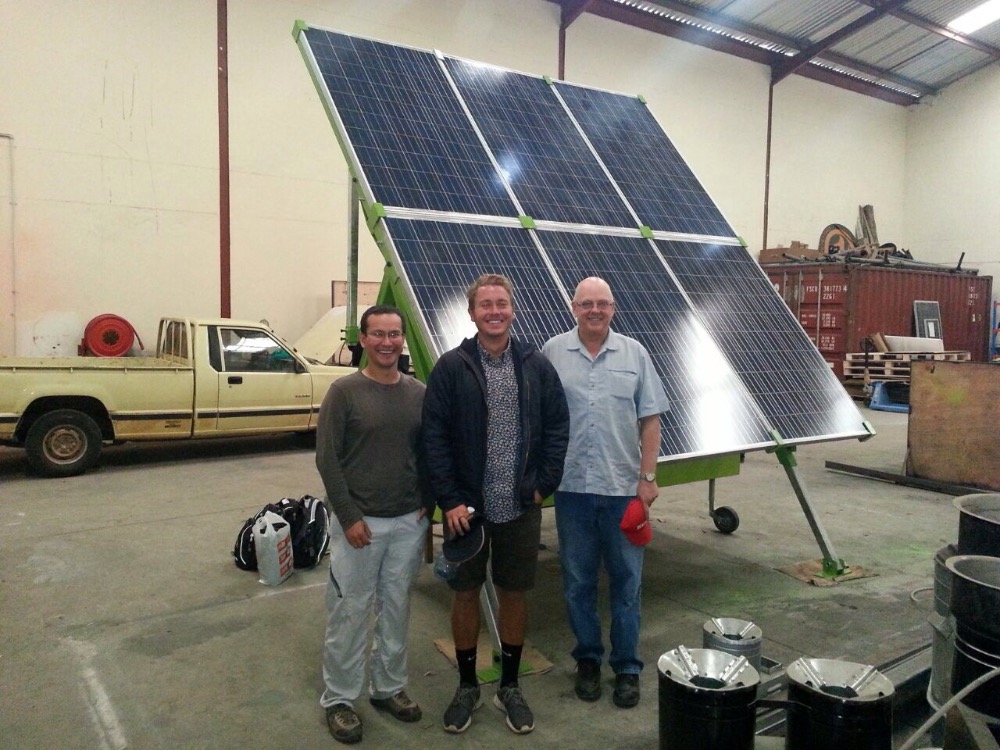
Support our project abroad
Where it all started...
A couple of months ago, Andrew and I graduated from Seattle University and set off on a one-way trip to South America. (You can read more about that here: http://www.geekwire.com/author/armand-pizzicarola-and-andrew-mewborn/) Our goal was to explore the entrepreneurial cultures in Latin America and we did just that until we were forced to return home due to matters out of our control. After a month and half of traveling, we were devastated to have to turn back to Seattle as we were planning our route down south.
After scrambling to find jobs upon our return, we were hit with some exciting news: we had been accepted to bring a non-profit through the most notable accelerator in Latin America, StartupChile (startupchile.org). Although we would have liked to immediately commit, we knew we weren’t in the financial position to swing it. StartupChile injects its projects with $40,000 for six months, but only $800/month can go to our personal expenses - enough to cover living expenses in Santiago, but not enough to make payments on student loans.
After wrestling with the decision and speaking with our mentors and advisors in the one-week window we had to accept the invitation, the choice was clear: GO. Is this the most financially responsible choice we could have made? Probably not. But after years of soaking up knowledge from successful and inspirational individuals around the world, we trusted the gut decision to follow our passion and take advantage of this once-in-a-lifetime opportunity. After all, we’re only 22 and the youngest entrepreneurs to be accepted into the program.
Our StartupChile application:
Gridlee: As one of the first non-profits to be accepted into StartupChile, Gridlee’s initial goal is to provide access to electricity to schools around the world.
As an electrical engineering major, Andrew’s senior project was to design and implement a solar trailer for a small school in Muhuru Bay, Kenya. Alongside organizations such as IEEE (ieee.org) and CSI (communitysolutionsinitiative.org) , they’ve implemented a program where students bring their “battery pack” to the school charging station (solar trailer) in the morning, let it charge throughout the day, and bring it home at night as source of electricity to provide light to read, study, charge their cell phones, etc. Each solar trailer charges 40 battery kits and the station is maintained and serviced by an individual vetted and appointed by the school’s headmaster. To create sustainability, the students pay a monthly fee to check-out the battery packs; providing an income and incentive for the appointed director to keep the solar trailer in shape, as well as providing a cleaner and renewable alternative to kerosene.
IEEE and CSI have done a great job with the model and technology; we’re here to scale it and drive a community to get behind the cause.
The legal formation of a non-profit can take up to two years; time in which we simply can’t personally finance the operations. Thanks to CSI, we don’t have to spend the $14,000 that each solar trailer cost - the first one will be donated so that we can run a pilot program and figure out the most scalable way to provide access to electricity for student worldwide. Following the pilot, we look to comply with the 100% model where 100% of donations raised from the public fund the trailers and programs - not our operations. And to do that, we’re going to need a bit of initial support so this project doesn’t fall through the cracks.
There are 1.4 billion people without access to electricity….lets change that.
Below you can get an idea of the solar community charging station that we will be deploying. Each charging station can charge up to 80 battery kits. Each battery kit can last an average of 2 days and has the ability to charge cell phones, power LEDs, radios and refrigerators. Each battery kit that we deploy will power two light bulbs that will serve 6 individuals in a typical household. This means that each charging station we deploy can be credited with reaching about 500 individuals. The charging station can also be connected to schools/medical centers to power them directly.
The coolest part about these charging stations is that we will also be installing a data monitoring device to each one. This means that information on the charging stations such as voltage and current will be transmitted to our database over cell networks. We will be able to tell how each charging station is running and when it needs maintenance.

A couple of months ago, Andrew and I graduated from Seattle University and set off on a one-way trip to South America. (You can read more about that here: http://www.geekwire.com/author/armand-pizzicarola-and-andrew-mewborn/) Our goal was to explore the entrepreneurial cultures in Latin America and we did just that until we were forced to return home due to matters out of our control. After a month and half of traveling, we were devastated to have to turn back to Seattle as we were planning our route down south.
After scrambling to find jobs upon our return, we were hit with some exciting news: we had been accepted to bring a non-profit through the most notable accelerator in Latin America, StartupChile (startupchile.org). Although we would have liked to immediately commit, we knew we weren’t in the financial position to swing it. StartupChile injects its projects with $40,000 for six months, but only $800/month can go to our personal expenses - enough to cover living expenses in Santiago, but not enough to make payments on student loans.
After wrestling with the decision and speaking with our mentors and advisors in the one-week window we had to accept the invitation, the choice was clear: GO. Is this the most financially responsible choice we could have made? Probably not. But after years of soaking up knowledge from successful and inspirational individuals around the world, we trusted the gut decision to follow our passion and take advantage of this once-in-a-lifetime opportunity. After all, we’re only 22 and the youngest entrepreneurs to be accepted into the program.
Our StartupChile application:
Gridlee: As one of the first non-profits to be accepted into StartupChile, Gridlee’s initial goal is to provide access to electricity to schools around the world.
As an electrical engineering major, Andrew’s senior project was to design and implement a solar trailer for a small school in Muhuru Bay, Kenya. Alongside organizations such as IEEE (ieee.org) and CSI (communitysolutionsinitiative.org) , they’ve implemented a program where students bring their “battery pack” to the school charging station (solar trailer) in the morning, let it charge throughout the day, and bring it home at night as source of electricity to provide light to read, study, charge their cell phones, etc. Each solar trailer charges 40 battery kits and the station is maintained and serviced by an individual vetted and appointed by the school’s headmaster. To create sustainability, the students pay a monthly fee to check-out the battery packs; providing an income and incentive for the appointed director to keep the solar trailer in shape, as well as providing a cleaner and renewable alternative to kerosene.
IEEE and CSI have done a great job with the model and technology; we’re here to scale it and drive a community to get behind the cause.
The legal formation of a non-profit can take up to two years; time in which we simply can’t personally finance the operations. Thanks to CSI, we don’t have to spend the $14,000 that each solar trailer cost - the first one will be donated so that we can run a pilot program and figure out the most scalable way to provide access to electricity for student worldwide. Following the pilot, we look to comply with the 100% model where 100% of donations raised from the public fund the trailers and programs - not our operations. And to do that, we’re going to need a bit of initial support so this project doesn’t fall through the cracks.
There are 1.4 billion people without access to electricity….lets change that.

Below you can get an idea of the solar community charging station that we will be deploying. Each charging station can charge up to 80 battery kits. Each battery kit can last an average of 2 days and has the ability to charge cell phones, power LEDs, radios and refrigerators. Each battery kit that we deploy will power two light bulbs that will serve 6 individuals in a typical household. This means that each charging station we deploy can be credited with reaching about 500 individuals. The charging station can also be connected to schools/medical centers to power them directly.
The coolest part about these charging stations is that we will also be installing a data monitoring device to each one. This means that information on the charging stations such as voltage and current will be transmitted to our database over cell networks. We will be able to tell how each charging station is running and when it needs maintenance.

Organizer
Armand Pizzicarola
Organizer
Seattle, WA